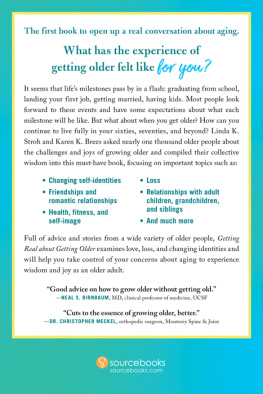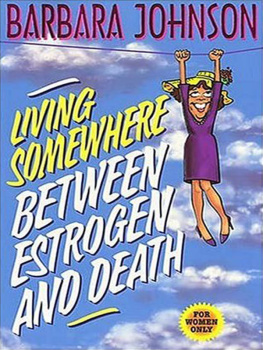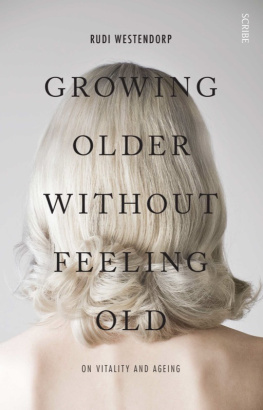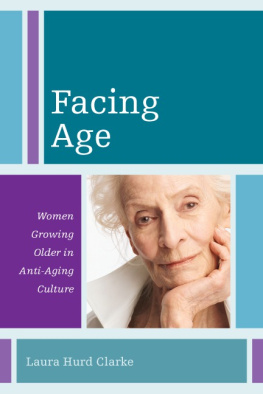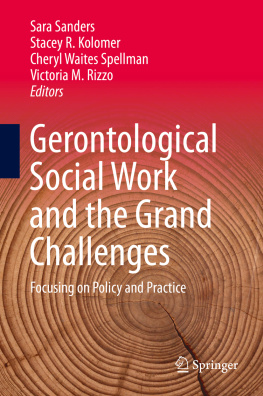No part of this publication may bereproduced, stored in a retrieval system, or transmitted, in any form or by anymeans, electronic, mechanical, photocopying, recording or otherwise, withoutthe prior permission of the copyright owner.
This book is sold subject to thecondition that it shall not, by way of trade or otherwise, be lent, resold,hired out, or otherwise circulated without the publishers prior consent in anyform of binding or cover other than that in which it is published and without asimilar condition including this condition being imposed on the subsequentpurchaser. Under no circumstances may any part of this book be photocopied forresale.
Some names and identifying detailshave been changed to protect the privacy of individuals.
INTRODUCTION: OLD AGE IS NOT A FOREIGN COUNTRY
Somewhere in the middle of myseventies, I realised that I liked being old.
Or, to be more accurate, I likedbeing old, in good health and extremely lucky. Indeed, I had liked it for yearswithout acknowledging the fact. Yes, there were definitely some downsides, Iwouldnt argue about that. But there were also huge compensations, which Ireally wasnt expecting. Since there are numerous books about the many physicaland emotional demands of ageing the trials of being the carer of someone youlove, the experience of widowhood, the survival of life-threatening diseases,to name a few I wanted to write a celebration of being older.
Not long ago, I was reminded of thesaying, The past is a foreign country: they do things differently there,which is the first line of the novel, The Go -Between, written by L. P.Hartley in 1953. I began to wonder whether it was right or not, in terms of myown past. But my thoughts quickly took a different turn. The question buzzingin my head was whether the same was true of the future, when viewed from theperspective of younger people. Do we see old age as a completely differentplace, with few or no familiar handles to provide something we might hold onto?
When I was young pick any age upto 50 or so I definitely thought that the future was a foreign country. Itwould be strange to me and it would be difficult to cope with. And they woulddefinitely do things differently there. I looked around at the old people Iknew and they clearly had different interests and temperaments and feltaltogether different to me. It was not something I looked forward to.
Yes, I knew that at some point Iwould become an old lady, but that in itself seemed an odd concept. Me old?Surely not. It was, literally, unimaginable. Best not to spend much timethinking about it.
At the same time, I vaguely assumedthat if it ever happened, I would be a different person when I got there. Iwould have the same name and the same history, of course, but there theresemblance would end. I somehow thought that when I was magically transformedinto this strange state of old womanhood, I would be unrecognisable. I wouldnot be the me I had always known. It was going to be hard I would not knowhow to navigate all the twists and turns foisted on me by the passage of time.It would be a double learning problem a new me in a new landscape.
How very, very wrong could I be.Now that I am an old lady by most measures, moving inexorably toward my 80thbirthday, I realise that old age for me is not another country at all. Yes,there are aspects of my life that are different, but I dont feel that I amwandering in a strange land. And there is a great deal that is very much thesame.
Old age creeps up on us ratherstealthily, even if we dont make a fuss of our birthdays. Only a few thingshappen fast, like retirement from your lifetimes work, although in my case, Iworked freelance and work just slowly stopped coming in. But generally, it simplymeans a few things changing each year the hair getting whiter, the wrinklesgetting deeper and so forth. You walk a little slower, your hearing becomesslightly more difficult, sometimes you even become shorter. I could list many moresuch small transformations. You get used to one thing, absorb that and startgetting used to another. It may even be more than one thing at a time.
Yet there are very few shocksinvolved, in the absence of a significant death or illness, which is anothermatter altogether. At the same time, other things happen too. Some aredefinitely negative friends die or become much more ill. Your energy slowlydiminishes, so you tend to be more homebound. Your body doesnt always do whatyou intend. You become more aware of your own mortality. It is a time forpondering.
But on the positive side, you mayacquire grandchildren and they may become a very active and joyful part of yourlife. Your relationship with your adult children changes and, with luck, deepens.The same is true for friendships. Not to mention marriage. And you are almostinevitably much, much more comfortable in your own skin. You feel your trueself as never before.
And, most important, as you getused to these changes, you realise it is the same old you dealing with them. Forgood or ill, there is no amazing metamorphosis. Whatever your character andpersonality at age 30, you will almost inevitably be the same at 60 or 70 and beyond. If you were an optimist when you were young, you will find yourselfstill an optimist later. If you had a tendency to fuss over unexpected events,you are almost certainly still fussing later. If you laughed at whatever lifethrew at you, you will be laughing still. It makes everything much morefamiliar.
I was reminded that when my motherwas about 50, she declared to my father that she had decided to become aneccentric old lady. That sounded a good ambition to me at the time, but myfather laughed Youve never been eccentric in your life, he commented accurately,so you wont be eccentric then. You will be you. And he was right. Shenever became the least bit eccentric. She died age 91 after a spell ofdementia, but a serious woman to the end.
I think this is good news, althoughperhaps not everyone will agree. It means that by the time you reach old age however defined you have lived with yourself a long time and are likely to knowhow to cope with your own individual ways. You grow into yourself and, ifanything, become more so. You can relax and enjoy each day more. Yes, thereare some new challenges, but they are softened by new joys. None of this isinevitable, but neither is the opposite. It is not unreasonable to hope for.
This is what this book is about.
STORIES FROM MY LIFE
Why are those people going down into the earth?
1959
I was 17 years old, due to startuniversity in a few weeks and standing at the top of the Empire StateBuilding with a group of newly arrived African students. They were full ofexcitement and hope at having made it to the United States, shortly to bedispersed to their respective universities. Yet looking over New York City inall its vibrant glory, one young woman standing next to me began to weep.Timidly at first, I put my arm on hers and gently asked her why. She said shewas worried that she wouldnt like America after all. In her country, it wasgreen, there was a lot of grass and trees and it was very beautiful theUnited States was so very different.



